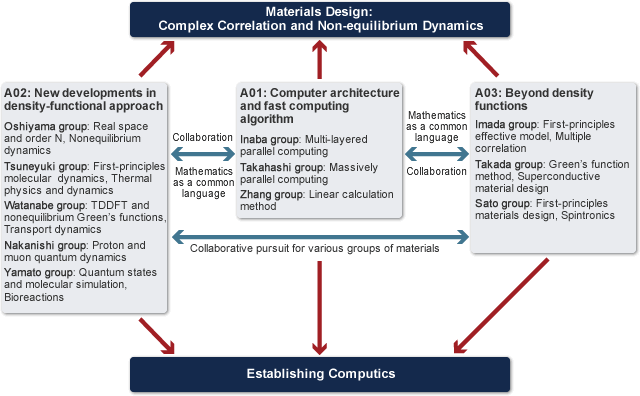- Home
- Organization and Research Strategy
Organization and Research Strategy
We believe that the following three are the keys to success in this research area: (1) integration of computational science and computer science, (2) integrative development of various calculation techniques in computational science, and (3) collaboration of computational and experimental materials science. Successful integration of computational science and computer science requires thorough discussions of materials science problems using mathematics as a common language. To ensure such discussions, experts in computational science gather in Team A01 to explore the future of HPC by considering the common mathematical structure without being bound by the particularity of an individual problem in materials science. Additionally, collaborative teams, which extend beyond the borders of traditional disciplines, are formed to address specific individual problems and to improve calculation techniques. Teams A02 and A03 consist of researchers from various organizations. These diverse teams focus on complex correlations and non-equilibrium dynamics using various techniques suitable for each project. Additionally, these collaborations within a research project promote the development of new calculation techniques. Furthermore, during the first fiscal year of a research project, experimentalists are appointed as liaisons. These joint efforts ensure that the calculable and measurable targets in computational science are consistent with experimental research projects that will be publicly solicited in the next fiscal year.
Research Area Leader
Atsushi Oshiyama (Professor, Graduate School of Engineering, The University of Tokyo)
Projects Leaders
Team A01
| Leaders | Projects |
|---|---|
| Mary Inaba (Associate Professor, Graduate School of Information Science and Technology, The University of Tokyo) |
Research and development of ultrafast and ultra-low-power-consumption simulation techniques for materials science |
| Daisuke Takahashi (Associate Professor, Graduate School of Systems and Information Engineering, University of Tsukuba) |
Numerical calculation algorithms in massive parallel computing environments |
| Zhang Shao-Liang (Professor, Graduate School of Engineering, Nagoya University) |
Fast solution for ultra-large scale systems as a basis of computational materials science |
Team A02
| Leaders | Projects |
|---|---|
| Atsushi Oshiyama (Professor and Research Area Leader, Graduate School of Engineering, The University of Tokyo) |
Dynamics of electron theory in the formation of nanostructures and the emergence of new functions |
| Shinji Tsuneyuki (Professor, Graduate School of Science, The University of Tokyo) |
Studies on structured sampling and non-equilibrium dynamics using ab initio molecular dynamics methods |
| Satoshi Watanabe (Professor, Graduate School of Engineering, The University of Tokyo) |
Studies on non-equilibrium dynamics of nanoscale electrical conduction based on density functional theory |
| Hiroshi Nakanishi (Assistant Professor, Graduate School of Engineering, Osaka Unviersity) |
Investigation of new physical properties and quantum dynamics using protons and muons |
| Takahisa Yamato (Associate Professor, Graduate School of Science, Nagoya University) |
Exploration of reactions and structural space in multi-degree-of-freedom and large-scale systems |
Team A03
| Leaders | Projects |
|---|---|
| Masatoshi Imada (Professor, Graduate School of Engineering, The University of Tokyo) |
Frontiers of an ab initio effective model and correlation science |
| Yasutami Takada (Professor, Institute for Solid State Physics, The University of Tokyo) |
Many-body theory of ab initio excitation states and design of high transition temperature superconducting materials |
| Kazunori Sato (Associate Professor, Graduate School of Engineering, Osaka University) |
Exploration of spin-electronics materials |






